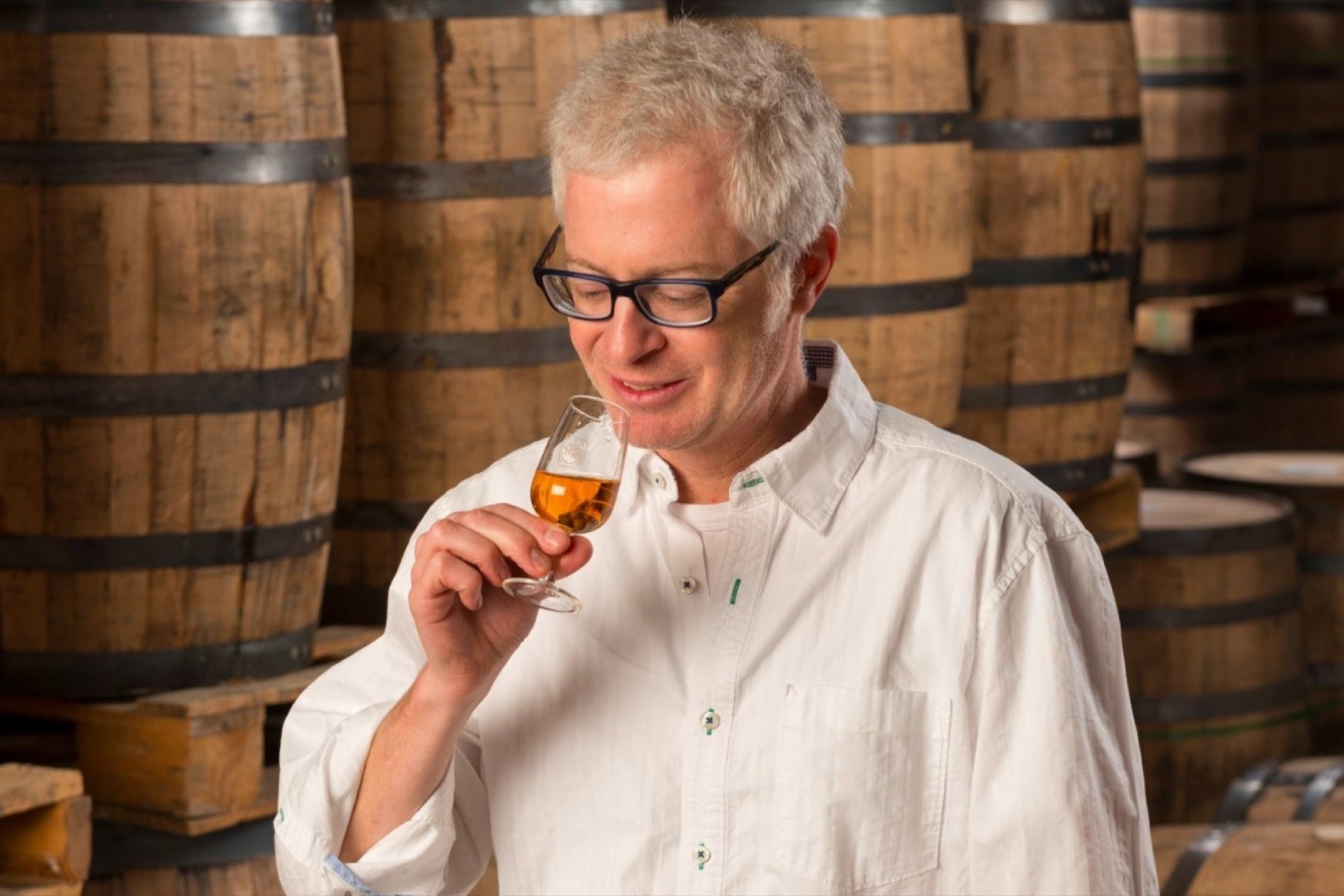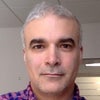This Founder Ditched His Career at 40 and Turned a Hunch Into Millions The only way to find out what will happen is to go ahead and try, says the creator of High West Whiskey.
By Dan Bova •


Editor's Note: Entrepreneur's "20 Questions" series features both established and up-and-coming entrepreneurs and asks them a number of questions about what makes them tick, their everyday success strategies and advice for aspiring founders.
Some people go to weddings and come home with sore feet. David Perkins went to a wedding and came home with an entirely new career.
In 2009, when the biochemist, then 40, went to Kentucky for a wedding, he visited the Maker's Mark Distillery. During the tour, he couldn't help but notice the similarities between the distillery and his biotech labs. A light bulb went off.
"I told my wife then and there that I think we should do this," Perkins says. She agreed.
The "this" he speaks of entailed packing up their lives and moving to Utah to start his own whiskey label, High West, where he could distance the brand from the Kentucky pack—The High West Saloon & Distillery is the only place in Utah where you can buy a bottle of whiskey on a Sunday—and where he and his family could "up our skiing game."
Related:
"It might seem like it was a spur-of-the-moment decision, but I feel like everything I did in life led me up to that moment," Perkins told Entrepreneur. "I always wanted to do my own thing, and even when I was working as a biochemist for a larger company, I was an "intrapreneur.' I pretty much always had jobs where they let me do whatever I wanted to do as long as I asked them. I'm about as proactive a person as you can get."
Perkins' proactiveness paid off. After 12 years, he sold his successful whiskey to Constellation Brands for a reported $160 million. "They were the right company to take the reigns," he says. "It was 12 years, a long haul, so I was ready." He remains an employee and has no plans for retiring. "As long as this is still fun, I'll stick around," he explains.
Perkins encourages people to follow their passions and to not ignore that tingly feeling when a lightning bolt of an idea strikes. "I'm a big believer in serendipity," Perkins says. "To paraphrase Thomas Jefferson, "I'm a big believer in luck. The harder I work, the more luck I have.' You can't tell what will happen, but you can certainly see what could happen."
We caught up with the whiskey wizard and asked him 20 questions to figure out his recipe for hard work and luck.
1. How do you start your day?
By opening my eyes! Then I make a great cup of coffee and eat breakfast with my family. I love starting my day with my family. We try never to eat separately. My family grounds me and reminds me what is important to me. Then I plan my day with a list of priorities.
2. How do you end your day?
I try to unplug and re-ground myself. It is certainly with my phone off, but hopefully, it's also with my arm around someone. My youngest is my 12-year-old son -- a night cuddling with him watching something and sipping my whiskey is about the closest to nirvana I can get. The point is to reconnect with my family, which grounds me. If I have some late night work to do, I'll go back to it after that family connection time.
3. What's a book that changed your mind?
The Meaning of Human Existence by Edward O. Wilson. He's the world's leading expert on ants and reminds us how small and insignificant we are. And he really blasts religion. It was a great way to remind myself that I'm not super important, that I should not take myself too seriously and that I'd better enjoy the journey.
Related: 10 Successful Entrepreneurs Reveal the Books That Changed Their Lives
4. What's a book you always recommend?
A History of the World in 6 Glasses by Tom Standage. It was a gift from a good friend after my wife Jane and I started High West. The author tells the story of humanity through the lens of beer, wine, spirits, coffee, tea and cola. If you can't relate to his book you are not a human! Again, a great way to help us remember to enjoy the journey and that sharing time together -- whether over a meal or a drink -- is the best way to enjoy the journey. It helped me to think about High West as more than a product.
5. What's a strategy to keep focused?
Set your priorities and then do one thing at a time. I had a boss a long time ago that would come into my office at the end of the day and if I had piles of stuff on it, he would clear my desk onto the floor (he only did it once!). His point was to do one thing at a time and focus on it. How could he trust that I would get his priorities completed if my desk was cluttered?
6. When you were a kid what did you want to be when you grew up?
A cutter -- a surgeon that is. I like to work with my hands and like being very precise. Luckily I changed my mind and translated biochemistry into the business world instead of being a physician.
7. What did you learn from the worst boss you ever had?
The importance of loyalty. I learned this from the worst and the best boss I ever had. We all make mistakes and without loyalty, no one would have a job. Trust is everything for us imperfect humans. The loyal boss (or employee) gives you the benefit of the doubt, can set those mistakes aside, connects with you with honest feedback and then you move on and enjoy the journey together with someone you know and trust.
8. Who has influenced you most when it comes to how you approach your work?
My dad. He used to always say, "Plan your work then work your plan." I think of that every day when I make a list of what I am going to do that day. In fact, when I get stressed, I catch myself saying that silly phrase! And it always works to calm my heart rate and get me back on track if I am feeling overwhelmed.
Related: 6 Tips for Goal Setting That They Don't Teach You in College
9. What's a trip that changed you?
I went to the Peruvian rainforest with my dad, his brother and my cousin. It was mind-boggling to be in a place where more than 20 percent of the world's oxygen is produced, and more than half of the world's estimated 10 million species of plants, animals and insects live, and one-fifth of the world's freshwater is contained.
It was also a spiritual experience for me as a scientist as I met a psychic that told me things that she shouldn't have known. I could not call B.S. on that (which I normally would). That taught me to have an open mind and that my way isn't always the right way.
10. What inspires you?
Being around passionate people. They are always contagious for me and they get my juices going. And they come from all walks of life, not just famous artists or musicians.
I remember a summer job I had in college where I worked in a warehouse as a puller and packer. It's about the most boring job you could ever imagine. I really liked one of the older guys that worked there as he was super-intelligent and we always had great conversations at lunch. He rode the forklift around with a big smile and would tell me to do my best and be the best at the job I was doing, no matter what. He exuded passion for his job when he was on the warehouse floor. It made everyone feel good. I think of him all the time when I interact with anyone on the job.
11. What was your first business idea and what did you do with it?
I started a bicycle company in college and got all my friends sexy Italian bikes. I didn't make any money but it was fun learning about distribution and importing.
Related:
12. What was an early job that taught you something important or useful?
I was a paperboy when I was 11. It taught me to do my job and not let my customers down no matter what. There were plenty of times at 6 a.m. that I did not want to get up and deliver the paper, but I never missed a day.
13. What's the best advice you ever took?
My dad's: "Plan my work and work my plan." It works every time.
14. What's the worst piece of advice you ever got?
If it was bad I guess I forgot it!
15. What's a productivity tip you swear by?
Exercising. It's an outlet. I need to get out of my head and for me, there's no better way for me than sweating. In Park City, my favorite way of doing that is downhill skiing. I forget about any work-related stress I have and find it very refreshing and a great way to help me focus when I get back to the desk.
Related: Entrepreneur's Best Advice for Super Productivity
16. Is there an app or tool you use in a surprising way to get things done or stay on track?
Pencil and paper. It helps me make a list of my priorities. I can't think of a better app!
17. What does work-life balance mean to you?
When we started our business, I found I would work all the time. Part of work-life balance was coming to terms with that and knowing I couldn't do that forever. It was learning that it's OK to enjoy work and that doing a small "touch" on the weekend could save some time during the week if I got out ahead of an issue.
It was being able to have a good enough relationship with my wife so she could tell me to "put it down!" I appreciated it every single time she did that.
18. How do you prevent burnout?
Doing something new or different. The most effective "new thing" for me is to read a good book. Learning about someone else's problems and how they solved them gets me out of my shell.
Related: How to Recognize and Beat Burnout
19. When you're faced with a creativity block, what's your strategy to get innovating?
Exercise -- the more intense, the better. I need to come to my desk without the baggage of mental stress.
20. What are you learning now?
I just finished a great book called The Coaching Habit: Say Less, Ask More & Change the Way You Lead Forever by Michael Bungay Stanier. It's pretty simple. He gives you seven questions to put into your quiver to ask your direct reports, your colleagues, even your family. You do just what the title says, and let me tell you, it really works.











